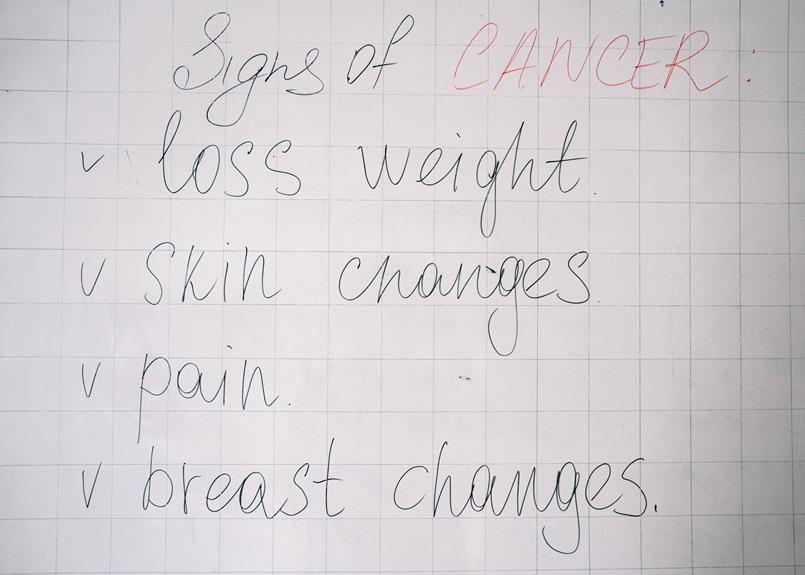How to Recognize and Manage Endometrial Cancer Symptoms

Are you aware of the signs and symptoms of endometrial cancer? This disease affects thousands of women each year, but early detection and management can greatly improve outcomes.
In this article, we will explore the common symptoms of endometrial cancer, the risk factors to consider, and the diagnostic tests available.
Additionally, we will discuss treatment options and lifestyle changes that can help manage symptoms.
Join us as we provide valuable information and support for those affected by endometrial cancer.
Key Takeaways
- Abnormal vaginal bleeding, pelvic pain, changes in bowel or bladder habits, unexplained weight loss, fatigue or weakness are common symptoms of endometrial cancer.
- Age, obesity, hormonal imbalances, family history, and early onset of menstruation and late menopause are risk factors for endometrial cancer.
- Transvaginal ultrasound, MRI, endometrial biopsy, and D&C are common diagnostic tests for endometrial cancer.
- Early detection improves patient outcomes and treatment success, and awareness of signs and symptoms, maintaining a healthy weight, exercising regularly, and hormonal therapy can help reduce the risk of endometrial cancer.
Common Symptoms of Endometrial Cancer
One common symptom of endometrial cancer is abnormal vaginal bleeding, which may include spotting between periods or after menopause. This can be a cause for concern, especially for those who have other risk factors for endometrial cancer.
It is important to understand the risk factors associated with endometrial cancer in order to take appropriate preventive measures. Some common risk factors include obesity, early onset of menstruation, late menopause, and hormone replacement therapy.
Understanding the Risk Factors
Understanding the risk factors associated with endometrial cancer is crucial for individuals to make informed decisions about their health and take appropriate preventive measures. Here are some important points to consider:
- Age: Endometrial cancer primarily affects women over the age of 50, although it can occur at any age.
- Obesity: Being overweight or obese increases the risk of developing endometrial cancer.
- Hormonal imbalances: Conditions such as polycystic ovary syndrome (PCOS) and estrogen therapy can increase the risk.
- Family history: Having a close relative with endometrial or colorectal cancer can raise the risk.
Keeping up with the latest research findings on endometrial cancer can help individuals understand prevention methods and the importance of early detection. By staying informed and taking proactive steps, we can reduce the risk of developing this disease and promote better health outcomes for ourselves and those we serve.
Diagnostic Tests for Endometrial Cancer
Diagnostic tests for endometrial cancer play a crucial role in early detection and effective management of the disease. These tests include imaging techniques like transvaginal ultrasound and magnetic resonance imaging (MRI), as well as endometrial biopsy and dilation and curettage (D&C).
The accuracy and reliability of these tests are essential in providing accurate diagnosis and guiding appropriate treatment options.
Types of Tests
The various screening tests available, such as transvaginal ultrasound and endometrial biopsy, are essential in detecting the presence of endometrial cancer. These tests provide valuable information that helps healthcare professionals make accurate diagnoses and determine appropriate treatment plans. When it comes to endometrial cancer, early detection is crucial for successful outcomes.
Along with these screening tests, there are several important factors to consider in managing endometrial cancer symptoms:
- Hormonal therapy options: These treatments involve the use of medications that target hormones, such as estrogen and progesterone, to help regulate the growth of cancer cells.
- Alternative treatment methods: Some individuals may explore complementary therapies, such as acupuncture or herbal remedies, to manage symptoms and support overall well-being.
- Emotional support: Dealing with a cancer diagnosis can be emotionally challenging, so seeking counseling or joining support groups can provide much-needed support.
- Lifestyle modifications: Adopting a healthy lifestyle, including regular exercise and a balanced diet, can help improve overall health and well-being.
Ensuring the accuracy and reliability of these screening tests is crucial in detecting endometrial cancer at an early stage.
Accuracy and Reliability
Several factors contribute to the accuracy and reliability of diagnostic tests for endometrial cancer. These factors include the use of advanced imaging technology and the expertise of healthcare professionals.
Accurate and reliable tests are crucial in the early detection and diagnosis of endometrial cancer. This is because they have a direct impact on the quality of life of patients. Early detection allows for more effective treatment options and improves the chances of successful outcomes.
Advanced imaging technology, such as transvaginal ultrasound and MRI, plays a significant role in improving diagnostic accuracy. These imaging techniques can provide detailed images of the endometrium, helping healthcare professionals identify any abnormalities or suspicious areas.
Furthermore, the expertise of healthcare professionals in interpreting these test results is essential in ensuring accurate diagnoses. Their knowledge and experience enable them to detect subtle signs of endometrial cancer and distinguish them from benign conditions.
Importance of Early Detection
An accurate and timely detection of endometrial cancer through early screening tests can significantly improve patient outcomes and increase the chances of successful treatment. Early screening allows for the identification of cancer at an early stage, when it is most treatable.
It is important for individuals to be aware of the signs and symptoms of endometrial cancer and to seek medical attention promptly if they experience any of these symptoms. Prevention measures such as maintaining a healthy weight, exercising regularly, and taking hormonal therapy under medical supervision can also help reduce the risk of developing endometrial cancer.
By prioritizing early screening and prevention, we can potentially save lives and improve the quality of life for those affected by endometrial cancer.
Moving forward, let us now explore the various treatment options available for endometrial cancer.
Treatment Options for Endometrial Cancer
There are several treatment options available for endometrial cancer.
Surgery is often the first choice, as it allows for the removal of the cancerous tissue.
Radiation therapy can also be effective in treating endometrial cancer, although it may have some side effects.
Additionally, chemotherapy may be used to target cancer cells throughout the body, but it can also cause various side effects.
Surgery as Treatment
Surgery, a primary modality in the management of endometrial cancer, offers an effective treatment option for patients diagnosed with this malignancy. It involves the removal of the uterus, fallopian tubes, and ovaries through various surgical options, such as hysterectomy or bilateral salpingo-oophorectomy.
Post-surgery recovery is crucial for patients to regain their strength and resume their normal activities. Here are four key points to consider during this phase:
- Adequate pain management to ensure patient comfort
- Close monitoring for any signs of infection or complications
- Encouraging a healthy diet and lifestyle to support healing
- Emotional support and counseling to address any fears or anxieties
Understanding the importance of surgical options and post-surgery recovery will pave the way for the subsequent section on the effectiveness of radiation therapy in the treatment of endometrial cancer.
Radiation Therapy Effectiveness
The effectiveness of radiation therapy in treating endometrial cancer has been proven through numerous clinical trials and studies. Radiation therapy benefits patients with endometrial cancer by targeting and destroying cancer cells in the pelvic area, reducing the risk of recurrence and improving survival rates. It is often used as an adjuvant treatment after surgery to kill any remaining cancer cells.
However, like any medical intervention, radiation therapy also comes with its own set of risks. The most common side effects include fatigue, skin irritation, and digestive problems. In rare cases, radiation therapy can lead to long-term complications such as damage to nearby organs. Despite these risks, the benefits of radiation therapy in treating endometrial cancer outweigh the potential drawbacks.
Transitioning into the subsequent section about chemotherapy side effects, it is important to understand the potential side effects of this treatment option as well.
Chemotherapy Side Effects
Chemotherapy side effects can vary from patient to patient, but commonly include nausea, hair loss, and fatigue. These side effects can significantly impact a patient's quality of life during treatment. It is essential for healthcare providers to address and manage these side effects to ensure the well-being of their patients.
- Managing nausea during chemotherapy: Nausea is a common side effect of chemotherapy and can be debilitating for patients. Healthcare providers can prescribe anti-nausea medications and recommend dietary changes, such as eating smaller, more frequent meals and avoiding spicy or greasy foods, to help manage nausea.
- Coping with hair loss during chemotherapy: Hair loss can be emotionally distressing for patients undergoing chemotherapy. Healthcare providers can provide support and resources to help patients cope with this side effect, such as recommending hats, scarves, or wigs, and connecting them with support groups or counseling services.
Lifestyle Changes to Manage Endometrial Cancer Symptoms
Implementing healthy dietary habits can significantly improve the management of endometrial cancer symptoms. Lifestyle modifications and alternative therapies can play a crucial role in supporting individuals affected by this condition. Making changes to one's diet can help reduce inflammation, boost the immune system, and promote overall well-being. Here is a table highlighting some dietary recommendations for managing endometrial cancer symptoms:
| Food to Include | Food to Avoid |
|---|---|
| Fruits and vegetables | Processed and fried foods |
| Whole grains | Sugary drinks and snacks |
| Lean proteins | Red and processed meats |
| Healthy fats (e.g., olive oil, avocado) | High-fat dairy products |
| Herbal teas and water | Alcohol and caffeine |
Incorporating these dietary changes, along with regular exercise and stress reduction techniques, can help individuals better manage their symptoms and improve their quality of life. By adopting a holistic approach, individuals can support their physical and emotional well-being during their journey with endometrial cancer.
Support and Resources for Those Affected by Endometrial Cancer
Numerous support and resource options are available for individuals affected by endometrial cancer, providing them with the necessary assistance and guidance throughout their journey. These options include:
- Support groups: Joining a support group can provide emotional support, encouragement, and a sense of community for individuals with endometrial cancer. Interacting with others who are going through similar experiences can help individuals cope with the challenges they may face.
- Financial assistance: Dealing with cancer can be financially burdensome. Thankfully, there are organizations and programs that offer financial assistance to individuals affected by endometrial cancer. These resources can help alleviate the financial strain of medical bills, treatment costs, and other related expenses.
- Educational materials: Access to accurate and reliable information is crucial for individuals affected by endometrial cancer. Educational materials, such as brochures, websites, and online forums, can provide valuable information about the disease, treatment options, and self-care strategies.
- Counseling services: Dealing with a cancer diagnosis can take a toll on an individual's mental health. Counseling services can provide emotional support, help individuals navigate their emotions, and develop coping mechanisms to manage the challenges they may encounter.
Frequently Asked Questions
What Are the Long-Term Survival Rates for Endometrial Cancer Patients?
The long-term prognosis for endometrial cancer patients depends on various factors, including the stage of the disease at diagnosis, the type of cancer, and the individual's overall health. Survival rates vary, but early detection and treatment can improve outcomes.
Can Endometrial Cancer Be Prevented?
Prevention strategies for endometrial cancer include maintaining a healthy weight, exercising regularly, and using oral contraceptives. Risk factors such as obesity, diabetes, and hormone therapy should be managed to reduce the chances of developing this type of cancer.
Are There Any Alternative Treatments or Therapies for Endometrial Cancer?
Alternative treatments and complementary therapies can be explored as adjunctive measures in the management of endometrial cancer. These options may include acupuncture, herbal remedies, mind-body therapies, and dietary modifications, but should always be discussed with a healthcare professional.
How Does Endometrial Cancer Affect Fertility and Pregnancy?
Endometrial cancer can have implications for fertility and may lead to complications during pregnancy. Understanding the impact of the disease on reproductive health is crucial in providing appropriate care and support to individuals affected by this condition.
What Are the Psychological and Emotional Effects of Living With Endometrial Cancer?
The psychological impact and emotional well-being of individuals living with endometrial cancer can be significant. Coping with the diagnosis, treatment, and potential side effects can cause anxiety, depression, and stress, highlighting the need for comprehensive support and care.








